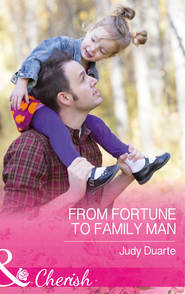По всем вопросам обращайтесь на: info@litportal.ru
(©) 2003-2024.
✖
Montana Dreaming: Their Unexpected Family / Cabin Fever / Million-Dollar Makeover
Автор
Год написания книги
2019
Настройки чтения
Размер шрифта
Высота строк
Поля
She expected him to turn on another lamp, but he strode toward the window and paused in front of the ugly gold drapes.
The droopy, rundown condition wasn’t her fault. And there wasn’t anything she could do about it. The rod was missing some of those little plastic thingies the metal hooks poked into.
But, hey. As long as she had privacy, she could live with them. After all, she’d lived with worse and been happy. When love and laughter filled the interior of a home, nothing else mattered.
He glanced over his shoulder. “You need to ask your landlord to replace the curtains.”
“I’m not going to push for anything like that right now. Not when Mrs. Tasker is going to be shorthanded in the diner and might have to replace me.”
He started to say something, but turned toward the curtain rod. He fiddled with the cord until he opened the drapes a couple of feet.
“I rented this place furnished,” she told him. “So I can’t be too fussy.”
Again, he withheld a comment, although she wished he hadn’t. She was prepared to argue. There was no need for him to feel sorry for her. She was glad to be in Thunder Canyon. Glad to have a job and a home for her baby. There was a lot to be said for counting one’s blessings.
She reached for the soft green covijita that draped over the back of the old sofa and pulled it close, brushing it against her cheek. Her abuelita had crocheted the small blanket, and Juliet cherished it.
“How many bedrooms do you have?” Mark glanced at the two doors along the east wall.
“Just one. The bathroom is on the left. The other door is the bedroom. Go ahead and put your bag in there. I’ll take the sofa.”
“No way.” He crossed his arms, standing sentry-straight, brow furrowed as though she’d suggested they run naked in a snowstorm.
“Shall we compromise?” She figured they could share turns.
“Sure. You take the sofa by day, and I’ll take it by night.”
She could argue, but what was the use? Mark was only looking out for her best interests. Besides, there would probably be plenty of times in upcoming days when they’d disagree. It was best if she chose her battles with this man.
Mark moved toward the bookcase where Juliet displayed her family photos instead of books. Her father had built it years ago. As far as quality, the wood was rustic and slightly flawed, but the piece of furniture was priceless.
He lifted a silver framed photograph of Abuelita holding Papa when he was a toddler.
“Did these pictures come with the place?” he asked.
“No. That’s my father when he was just a little boy. And that’s his mother. My abuelita.”
He replaced it and chose the one of Manny in his baseball uniform.
“That’s my brother, Manuel. He loved sports.”
Mark studied the photo for a while. “What kind of accident did he have?”
“It happened at the warehouse where he worked. A freak industrial accident, they told me. Involving a forklift.” She laid the magazine across her lap and tried to focus on something more pleasant. Something that didn’t remind her of her brother’s death, the lawsuit. Something that didn’t trigger thoughts of Erik Kramer, the attorney who’d volunteered to handle her interests in the workman’s compensation case. The jerk.
Mark replaced the silver frame, then turned away from the shelves. “I’m sorry your family isn’t around for you now.”
She shrugged and mustered a smile. “I have a lot of happy memories. Of the good times. And the unconditional love.” She ran a hand along the contour of her tummy, caressing her child. “And I have a new baby to look forward to. Life goes on.”
He merely studied her, looking skeptical. Hopeful. Concerned. A hodgepodge of emotion she found hard to decipher played havoc with his expression. But it didn’t do a thing to lessen the attraction that continued to build—in spite of her circumstances.
Dios mio, the man was handsome. Or maybe she found him more appealing, now that she’d gotten to know him better.
It felt weird to have him here. But at the same time, it was kind of nice. And she found it hard not to stare.
He slipped off his black leather jacket, hung it over the back of the recliner and sauntered toward the sofa. He’d dressed casually today, sporting a pair of worn jeans and a long-sleeved chambray shirt.
As he drew close, she caught a whiff of mountain-fresh cologne, menthol shaving cream and peppermint toothpaste. It was a taunting scent. Mesmerizing in a way. Her gaze locked on his, her pulse kicking up a notch. Did he know? Could he sense her inappropriate interest?
He cleared his throat. “It’s nearly nine o’clock, so we’d better think about breakfast.”
The husky sound of his voice, more graveled than usual, made her wonder if he’d ever been a smoker. If so, he’d given up the habit.
“You’ve got to be hungry,” he added.
She was. But she hadn’t realized it until now.
“Can I get you anything?”
“I’ll have a glass of milk. For the baby.”
He walked to the kitchen, opened the fridge and pulled out a carton of milk. Then he rummaged through the cupboards, looking for a glass. She could have helped him out, she supposed, telling him where to look, but she watched him instead, her interest and curiosity piqued. There was something about a man in the kitchen. Especially that man.
There was so much she didn’t know about Mark, other than he was a reporter who’d once been a local boy.
“Do you still have family around here?” she asked.
His movements slowed. “Yeah. My parents.”
That was nice. “Do you see them often?”
“No.” He filled the glass until the milk frothed at the top. “My folks and I had a falling out years ago.”
“That’s too bad.”
He shrugged. “We were never that close anyway.”
“Have you tried a reconciliation?” She knew the value of a family, the value of turning the other cheek. Of appreciating each individual personality, in spite of the differences. And the value of appreciating what you had, while you still had it.
“We talk, if that’s what you mean. But we aren’t very close. And I like it that way.” He brought her the milk. “Do you have anything I can use to make breakfast?”
He was going to cook? By himself?
Her father and brother couldn’t have fixed themselves a meal—maybe because Abuelita had claimed the kitchen as her territory. And even after she passed away, they hadn’t stepped foot near the stove. So, at the age of ten, Juliet had taken over. And eventually she became a pretty decent cook.
“I have eggs and bacon in the fridge,” she told him. “Orange juice, too. And the coffee is in the small canister on the counter.”
“Okay. I’ll fix something for us to eat. You just rest.”











